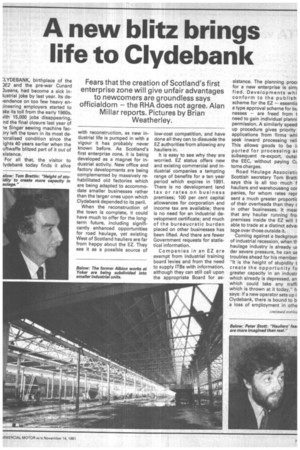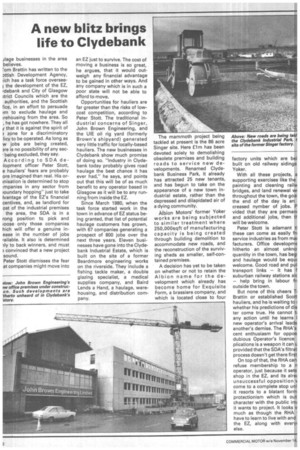A new blitz brings life to Clydebank
Page 45

Page 46

If you've noticed an error in this article please click here to report it so we can fix it.
Fears that the creation of Scotland's first enterprise zone will give unfair advantages to newcomers are groundless says officialdom — the RHA does not agree. Alan Millar reports. Pictures by Brian Weatherley.
;LYDEBANK, birthplace of the 2E2 and the pre-war Cunard 2ueens, had become a sick inlustrial joke by last year. Its delendence on too few heavy eniineering employers started to 3ke its toll from the early 1960s, vith 15,000 jobs disappearing, nd the final closure last year of ie Singer sewing machine facary left the town in its most deloralised condition since the ights 40 years earlier when the uftwaffe blitzed part of it out of xistence.
For all that, the visitor to lydebank today finds it alive with reconstruction, as new industrial life is pumped in with a vigour it has probably never known before. As Scotland's first enterprise zone, it is being developed as a magnet for industrial activity. New office and factory developments are being complemented by massively rehabilitated old factories which are being adapted to accommodate smaller businesses rather than the larger ones upon which Clydebank depended to its peril.
When the reconstruction of the town is complete, it could have much to offer for the longterm future, including significantly enhanced opportunities for road haulage, yet existing West of Scotland hauliers are far from happy about the EZ. They see it as a possible source of low-cost competition, and have done all they can to dissuade the EZ authorities from allowing any hauliers in.
It is easy to see why they are worried. EZ status offers new and existing commercial and industrial companies a tempting range of benefits for a ten year period which expires in 1991. There is no development land tax or rates on business premises; 100 per cent capital allowances for corporation and income tax are available; there is no need for an industrial development certificate; and much of the bureaucratic burden placed on other businesses has been lifted. And there are fewer Government requests for statistical information.
Companies in an EZ are exempt from industrial training board levies and from the need to supply ITBs with information, although they can still call upon the appropriate Board for as
sistance. The planning proco for a new enterprise is simi fied. Developments whi
conform to the publish scheme for the EZ — essentie
a type approval scheme for bu nesses — are freed from t need to gain individual planni permission. A similarly speed up procedure gives priority applications from firms whi seek inward processing reli This allows goods to be ii ported for processing ar subsequent re-export, outsi the EEC, without paying Ct. toms charges.
Road Haulage Associatic Scottish secretary Tom Bratti says this is all too much f hauliers and warehouseng cor panies, for whom rates repr sent a much greater proportic of their overheads than they c in other businesses. It mear that any haulier running fro: premises inside the EZ will t able to trade at a distinct advai tage over those outside it.
Coming against a backgroun of industrial recession, when th haulage industry is already ur der severe pressure, he can se troubles ahead for his member: "It is the height of stupidity t create the opportunity fo greater capacity in an industr which already is depressed, an which could take any traffi which is thrown at it today," h says: If a new operator sets up i Clydebank, there is bound to b a loss of employment in othe Jlage businesses in the area believes.
"om Brattin has written to the Dttish Development Agency, lich has a task force overseeI the development of the EZ, tdebank and City of Glasgow ;trict Councils which are the authorities, and the Scottish fice, in an effort to persuade )m to exclude haulage and 'rehousing from the area. So , he has got nowhere. They all v that it is against the spirit of ) zone for a discriminatory licy to be operated. As long as
w jobs are being created, 3re is no possibility of any secbeing excluded, they say. According to SDA delopment officer Peter Stott, e hauliers' fears are probably ore imagined than real. His orinisation is determined to stop ,mpanies in any sector from ioundary hopping" just to take Ivantage of the EZ's financial centives, and, as landlord for ost of the industrial premises the area, the SDA is in a rong position to pick and loose only those companies hich will offer a genuine inease in the number of jobs failable. It also is determined ily to back winners, and must ) convinced that a new project sound.
Peter Stott dismisses the fear at companies might move into
an EZ just to survive. The cost of moving a business is so great, he argues, that it would outweigh any financial advantage to be gained in other ways. And any company which is in such a poor state will not be able to afford to move.
Opportunities for hauliers are far greater than the risks of lowcost competition, according to Peter Stott. The traditional industrial concerns of Singer, John Brown Engineering, and the UIE oil rig yard (formerly Brown's shipyard) generated very little traffic for locally-based hauliers. The new businesses in Clydebank show much promise of doing so. "Industry in Clydebank today probably gives road haulage the best chance it has ever had," he says, and points out that this will be of as much benefit to any operator based in Glasgow as it will be to any running from inside the EZ.
Since March 1980, when the task force started work in the town in advance of EZ status being granted, that list of potential haulage customers has grown, with 67 companies generating a prospect of 800 jobs over the next three years. Eleven businesses have gone into the Clydebank Industrial Estate, which is built on the site of a former Beardmore engineering works on the riverside. They include a fishing tackle maker, a double glazing specialist, a medical supplies company, and Baird Lends a Hand, a haulage, warehousing, and distribution company. The mammoth project being tackled at present is the 86 acre Singer site. Here Lim has been devoted solely to demolishing obsolete premises and building roads to service new developments. Renamed Clydebank Business Park, it already has attracted 25 new tenants, and has begun to take on the appearance of a new town industrial estate, rather than the depressed and dilapidated air of a dying community.
Albion Motors' former Yoker works are being subjected to similar treatment where 250,000sqft of manufacturing capacity is being created through building demolition to accommodate new roads, and the reconstruction of the surviving sheds as smaller, self-contained premises.
A decision has yet to be taken on whether or not to retain the Albion name for the development which already has become home for Exquisite Form, a brassiere company, and which is located close to four factory units which are bei built on old railway sidings Yoker.
With all these projects, a supporting exercises like the painting and cleaning railvi bridges, and land renewal W■ throughout the town, the goal the end of the day is an creased nymber of jobs. P vided that they are permani and additional jobs, then th will be welcome.
Peter Stott is adamant tl these can come as easily fn service industries as from mai facturers. Office developme hitherto an almost unkna quantity in the town, has beg! and haulage would be equ4 welcome. Good road and put transport links — it has f suburban railway stations aft — help bring in labour fri outside the town.
But none of this cheers Ti Brattin or established Scott hauliers, and he is waiting to whether his predictions of dis ter come true. He cannot ti any action until he learns i new operator's arrival leads another's demise. The RHA's cent enthusiasm for oppos dubious Operator's licence plications is a weapon it can u provided that the SDA's filtrat process doesn't get there first On top of that, the RHA can refuse membership to a n operator, just because it sets shop in the EZ, and its alre; unsuccessful opposition v come to a complete stop unl it resorts to a blatant form protectionism which is out character with the public irni it wants to project. It looks v much as though the RHA have to learn to live with and the EZ, along with everyi else.






















































































